In 2006, a new entry popped into my idea journal: take my college notes and put them on a learning site.
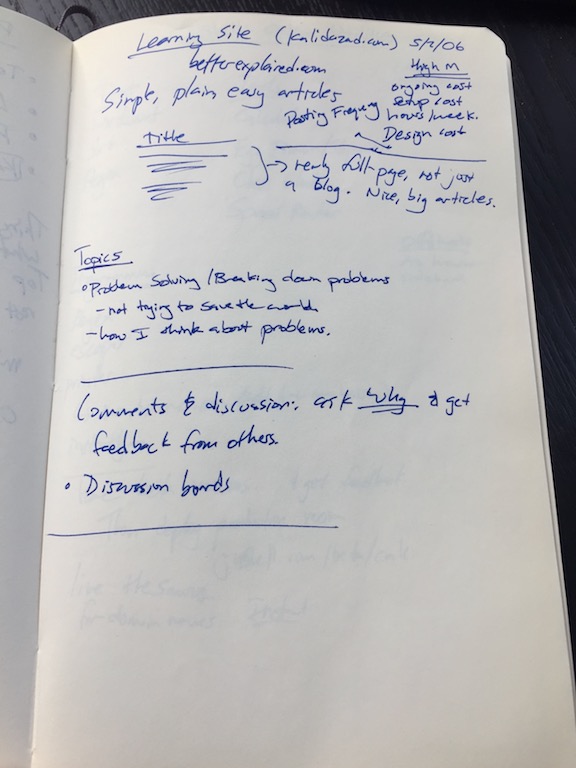
What should I call it: My name? Stuff explained simply? Better Explained? (Hey, not looking for the best... just... better!)
10 years, 168 posts and 220k words later, here we are.
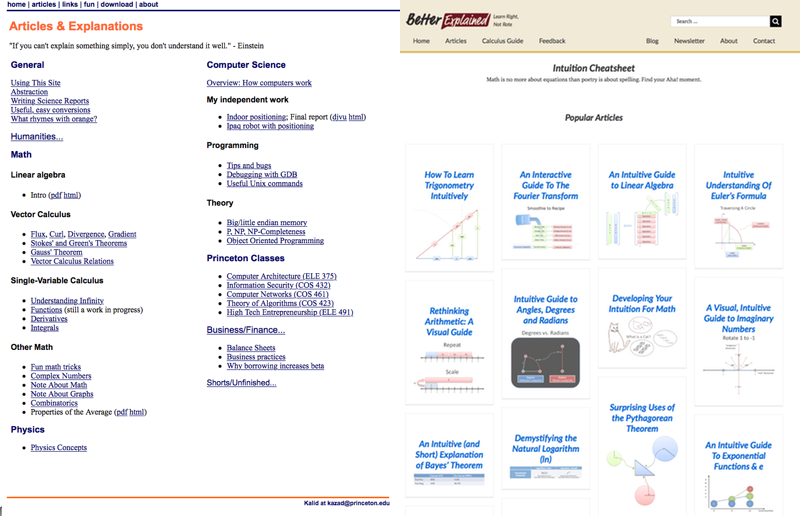
Below is a collection of thoughts on life and business after pursuing an idea for a decade.
Advice gets skewed by our personal experience, cognitive biases, and the presence of someone else (smile for the camera!). My strategy is to write for a single person -- a younger me -- as simply as I can.
Contents
- Quick Summary
- Core Motivation
- Writing Content
- Traffic
- A Passion Project vs. Business
- Dealing with Critics
- What went well, what didn't
- Assorted FAQ
- Did you intend to make money from Better Explained when you first started it (i.e. quit your job, etc)? Or was it just a side project that happened to take off?
- What topic aside from math do you think would be relevant to start a blog about?
- How do you stay motivated when you hit a particularly difficult barrier?
- How do you discover the insights? Do you study a lot of books/reference materials to build such meaningful insights?
- Have you ever been confident in your understanding, and suddenly someone proved/showed that changed your perception? What was that concept?
- How much time do you spend on each concept?
- Thank You
- Other Posts In This Series
Quick Summary
- Evergreen content: Work on what's still useful/enjoyable years later.
- Evergreen motivation: Find values that can inspire you for years. (Use a feelgood.txt list.)
- Be kind to yourself. Think about inputs, not outcomes. Try not to take things personally, or base yourself on these outcomes.
Core Motivation
Young Me: I'm worried I don't have my plans figured out yet.
It's ok. Be gentle with yourself. Not "gentle now to work harder later" but genuine compassion. Delay, confusion or disappointment may have a role, or be a warning sign, and you don't know ahead of time how things will work out. Better Explained exists because you didn't go to grad school as you'd hoped -- would you trade the two now?
There's an inner tug that knows what matters to you: Ideas can be understood intuitively and truly enjoyed.
How do you know what project to work on?
What lit a fire in your belly in the past? Better Explained began after overcoming immense frustration with a poorly-taught traditional math class. Concepts finally clicked after weeks, months or years -- argh, why couldn't they explain it simply in the first place?
Do you remember the exhilaration of being up all night and finally having an idea make sense? The anger of seeing friends discouraged from careers by poorly-taught, hoop-jumping math requirements?
Tap into what drives you.
But I'm still not sure what drives me.
10 years ago I started keeping a "feel good" list: if you have a great day, when you feel truly alive, write it down. A few scattered entries:
12/3/16 - WOW! I am cranking like insanity on instacalc. I have that fire in my belly where I just want to make things. Create what I can and see where it goes.
10/26/16 - Feeling great about myself for finishing the Coursera class! (machine learning). It’s motivating me to do other classes (Complex analysis.)
5/20/16 - from Chris XXXX. Loves getting the Better Explained emails.
Review the list for patterns. Even better, put your notes into a tag cloud tool and see what themes pop out:

My core values, things that make me feel alive, are:
- Curiosity and learning
- Helping others
- Getting in the zone, flow state, cranking away on a project
- Having fun / playful irreverence
Find an outlet that engages your values.
Writing Content
What should I write about?
Based on your values, find things that make you come alive. What grinds your gears? What do you desperately wish someone told you when starting?
General writing advice:
Pick evergreen topics: Imagine 5 years have passed since publishing your article. Is it still useful or interesting? If not, add strategy/insights that go beyond current events. (E.g., a post on simplicity vs. complexity might use an old video as an example, that's ok.). Fortunately, math is about as evergreen as it gets, since we study 2000-year old theorems. Even there, make connections and present general strategies.
Use more diagrams: Most technical content doesn't have enough analogies, diagrams, or examples (interactive is even better). For evergreen content, this effort pays back since the post is read for years. A 10-year old post on version control, ancient in the tech world, shows up in many presentations because of its images.
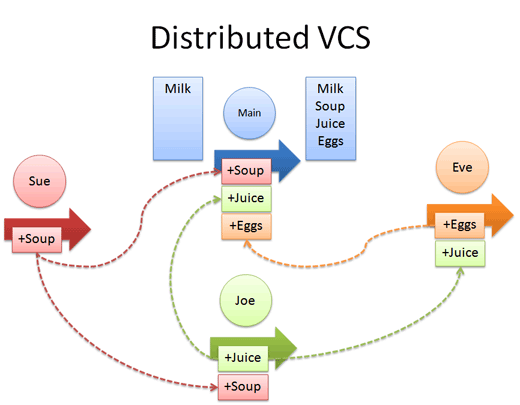
Embrace improvements over time: Evergreen text with evolutionary updates is a sweet spot. It can be updated years later with a fresh diagram, example, or embedded video. With video as a primary source, you have to redo the whole thing. (Where's the video version of Wikipedia?)
Empathize with your audience: Matter-of-fact textbooks sweep decades of math debate under the rug (imaginary numbers, Fourier Transforms). Share your personal struggle and how you overcame it. Highlighting your confusions makes the content both approachable and helpful. What would you share with a younger version of yourself?
How do I know the content is good enough?
Aim to genuinely help your readers in the long run. (You become your own reader when you revisit your post years later.)
My goodness, what I would have paid for one satisfying intuition on imaginary numbers in college. Read the article once and you're done. Boom, you have an insight that sticks in your mind and makes every math class so much easier.
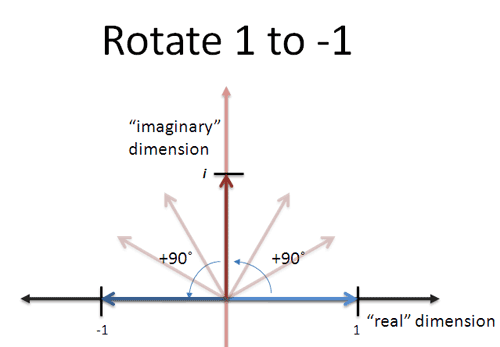
Today we see parades of clickbait "15 easy ways to learn imaginary numbers" articles. Maybe this week's lesson will finally work!
I call it the Men's Health problem. In theory, you should read one magazine and become superhuman. Yet somehow there's hundreds of issues, over years, detailing the same goal. Either the tips don't work, or the problem is with applying the tips, not getting more of them. (Issue 1: Here's 10 essential tips. Issue 2: Did you read and apply issue 1?)
Help your readers graduate beyond you. Google search is useful because it sends you away as fast as possible. And that's why you come back with new questions.
Traffic
How do I get more traffic?
With evergreen content, you're building nets to throw into the ocean. More nets = more fish.
With read-once content (like a newspaper), you're spear-fishing. More effort = more fish, but yesterday's effort doesn't help you today. It's exhausting.
Just keep writing content you'd read yourself, and over time you'll see a buildup:
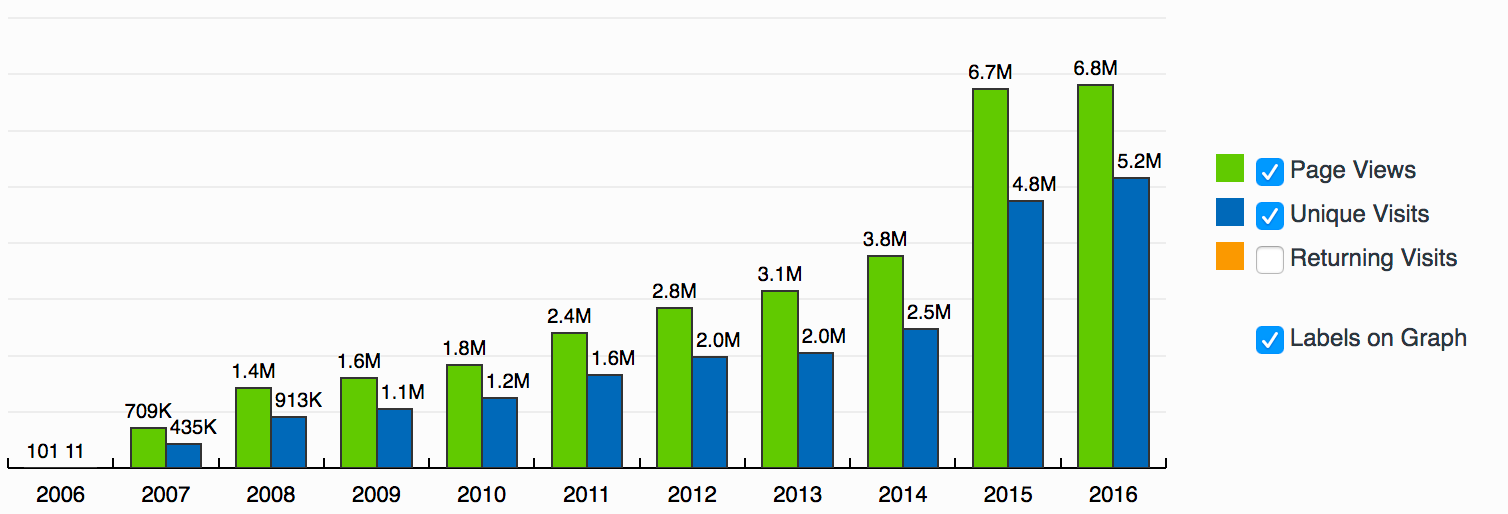
- Monthly traffic: ~450k visitors, 600k pageviews
- Lifetime traffic: 21M visitors, 32M pageviews
- Average annual growth: 23%
Raw Traffic Data
Analysis comes from this Google sheet.
Monthly Views vs. Year of Publication
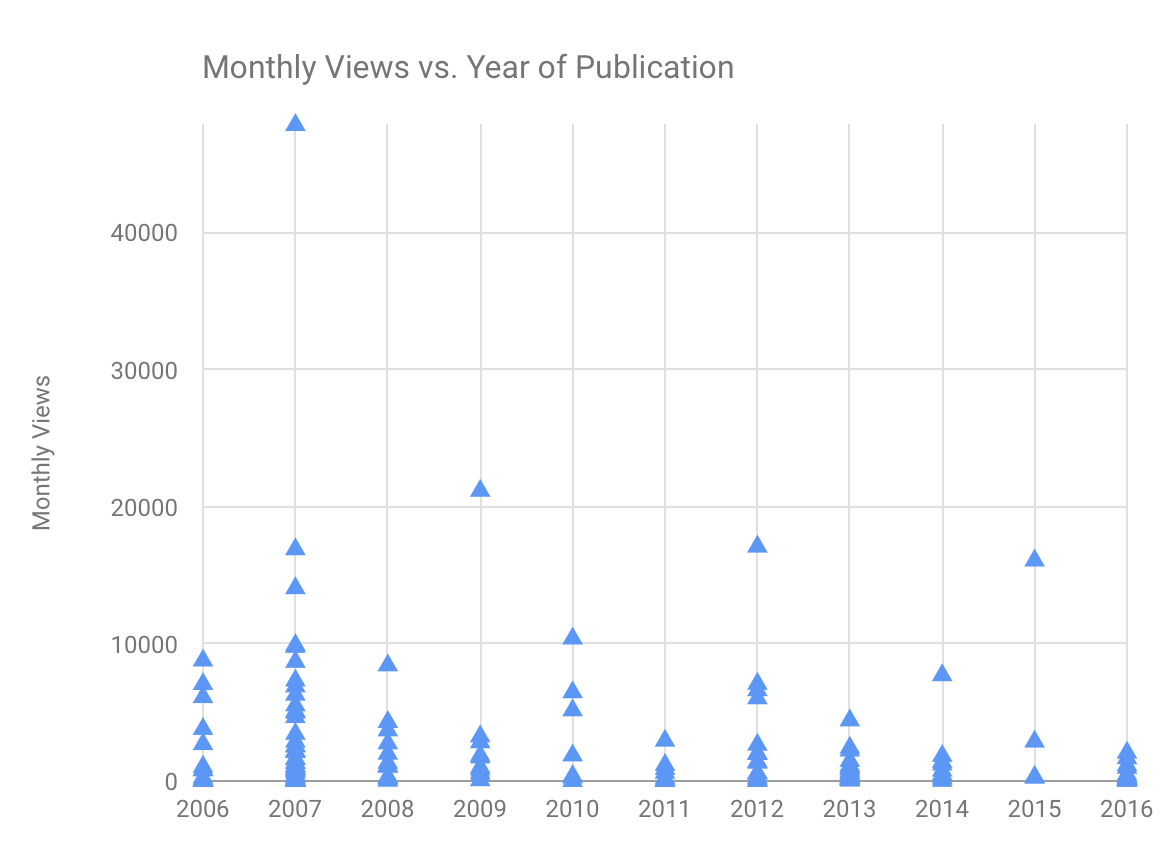
Old posts are just as good as new ones for generating today's traffic. Let that back catalog work for you - 45% of my traffic comes from 2007-era posts. (At that time, I had a lot of back content to import. I also had more time to spend after leaving my first job.)
Sleeper Hits
Each evergreen post has a chance to become a hit years later. A 2015 post on cross products was published quietly, and later became a top 5 article:

Maybe one of the 2016 posts will pick up steam next year. (In 2016 I tended to write more "strategy" posts, which are fun but don't get as much traffic as tactical "How to learn X" articles.)
Post Wordcount
Evergreen content doesn't have to be long. The average wordcount was 1310 (median 1273, max 3604).
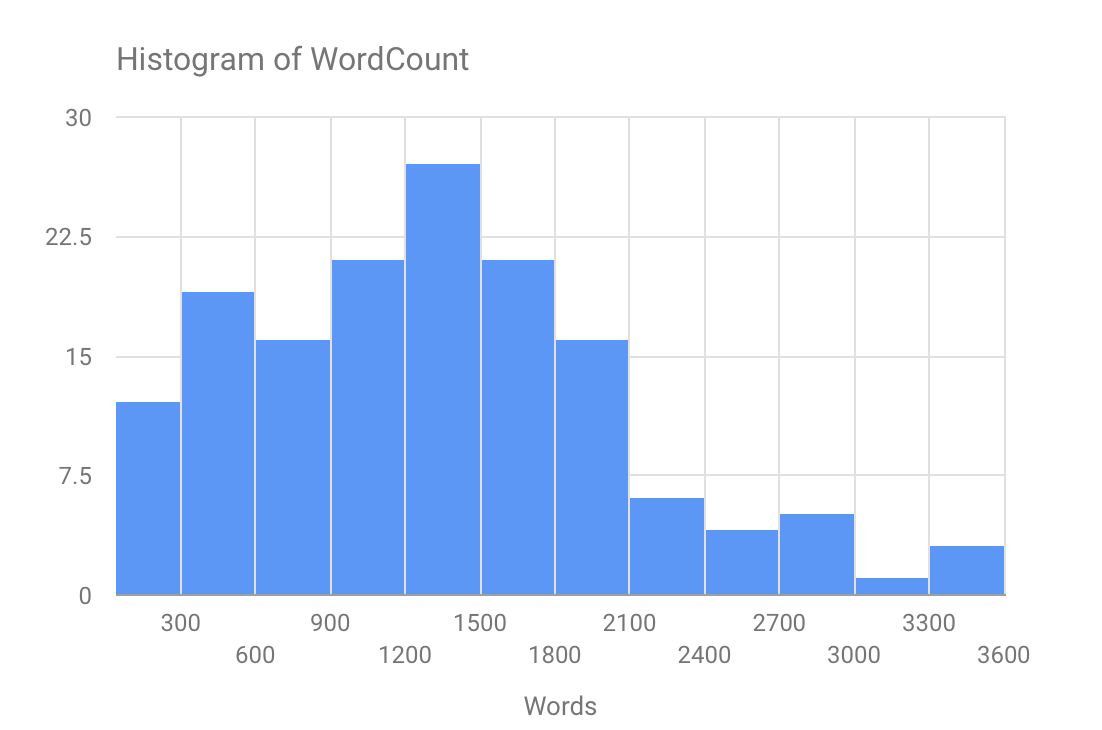
Let's see how wordcount impacts traffic:
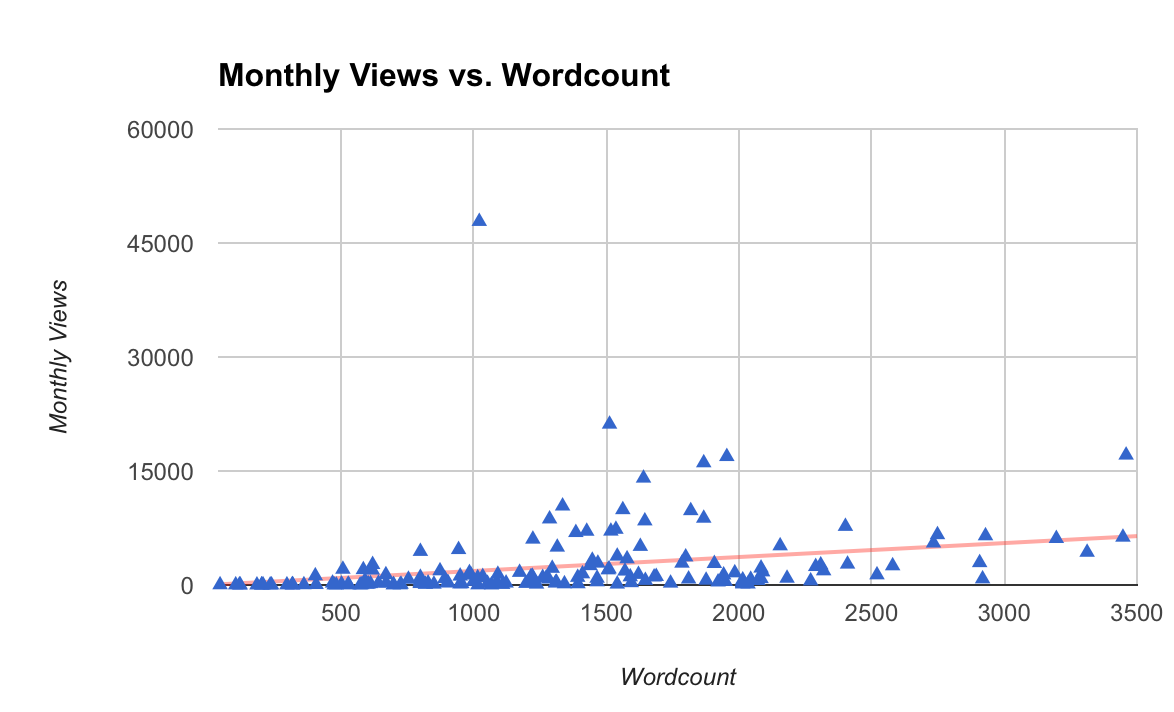
There is a modest positive correlation (.26) between wordcount and traffic. After an article reaches 1000 words, shorter articles (Combinations vs. Permutations, 1000 words) and longer articles (Fourier Transform, 3600 words) have similar popularity.
I don't have a wordcount goal, just a "helpfulness" goal: include an analogy, diagram, example, plain-english description, and technical description (ADEPT method).
(For what it's worth, this article is now the longest at about 4000 words.)
How long do I write for? Do I need to stay consistent?
Be willing to write for years. But if your content aligns with your values, and is interesting to you, it's a win-win. Traffic grows, you'll feel fulfilled, and you'll improve your writing and subject matter expertise.
It's not the fast path to Mega Blogging Success. But whether it takes 2 years or 10 doesn't matter, you're building something that fulfills you, and the time will pass anyway.
I wrote 220k words, averaging 60 words a day over the past 10 years. At 95 words per minute, that should only take 38 seconds a day (right?).
A desire for consistency, while helpful, isn't necessary and certainly shouldn't invoke a feeling of dread ("I shouldn't start if I can't be consistent").
In 2015, I wrote 4 posts (3 months per post) but hopped back on the wagon in 2016 (16 posts, 3 weeks per post). Being gentle with myself meant I looked forward to writing more without guilt.
There's a saying that long after you forget what someone did, you remember how they made you feel. Long after you forget what you wrote about, you remember how coming back to your project made you feel.
What about reddit, hacker news, etc.?
Have an account on a social service, use it normally, and learn the norms. If your content shows up, reply to questions and take feedback. It's ok if everyone doesn't love your cooking. (But seriously, why don't you?)
In 2006, I posted articles to smaller communities (like dzone.com), while today that'd be a small subreddit or forum. Participate, make things you'd want to read yourself, and stick with your values.
More pratical tips:
- Monitor live traffic with a browser plugin (I use Clicky). When a spike happens I can see it and respond quickly. When I hit reddit, I saw 3000 simultaneous readers on the site -- time to see what's happening!
- Make your site static. For WordPress, get a caching plugin that doesn't require the database to be active. (To verify: turn off your database and make sure your site still works.) This has burned me a few times.
- Have an "elevator pitch" for your site ready to go. What's it about? What's your best content?
- Examples of high-traffic social media events (12/22/2015)
- Reddit front page and discussion (I'm "pbzeppelin")
- 591k users, 968k pageviews (1.6 pages/visitor). 2:51 average session, 41% bounce rate.
- 2786 newsletter signups. (0.47%)
- Hacker news front page and discussion (I'm "kalid")
- 15k visitors, 39k pageviews (2.5 pages/visitor). 6:02 average session, 14% bounce rate.
- 277 newsletter signups (1.88%)
- For both discussions, I had rapid-fire replies to comments. Threads can become a mini-interviews and stay engaging.
- Useful content gets reposted. Ideally, someone you don't know is sharing your article with someone else you don't know. For example, the ELI5 reddit frequently asks about imaginary numbers, and my evergreen article usually gets referenced. The article has a lasting, visual intuition that imaginary numbers are like rotations in 2d which won't go out of style.
A Passion Project vs. Business
Should I pursue my passion as a full-time business?
You don't need to merge the two. If you want to make money, it's much easier to just get a day job, live simply, and invest your savings. However, financial independence is alluring and a side business (or other project) can speed that up.
For Better Explained, my goals are:
Goal #1: Do not lose my passion for learning (evergreen motivation)
Goals 2-1000: Help improve education, make a living, make friends/connections, have a portfolio, improve my writing, explore new technologies, get better at design, marketing, copywriting, and business.
This project is a lifelong mission and I'm ok if it accelerates slowly while enthusiasm is preserved.
Why is burnout the bogeyman?
I fear burnout because math enthusiasm is what I peddle.
There's plenty of standard details out there, I don't need to be the 105th site that introduces Calculus using the slope of the tangent line. (If your Calculus class completely ignores Archimedes, I'm going to... suggest you read this guide.)
I'm slowly coming to grips with the risks of diving deeper. If I lose interest, for whatever reason, it'll be ok. I'll forgive myself for a mistake made in the pursuit of something I care about. One door closing may open another.
But I really like the room opposite the door that's open now.
Could the site be a viable lifestyle business?
Patio11's bingo card creator reports inspired me about what was possible with my own products, and I share stats in that spirit. Given the traffic so far, the site more than covers my expenses, coming from:
- Amazon books on kindle (about 350 copies/month) and print (about 100 copies/month): \$3000-4000/m
- Direct course/book sales from website: \$1000-1500/m
- Math, Better Explained (full course)
- Calculus, Better Explained (full course)
- Amazon affiliate links: \$300-500/m
- Newsletter sponsorships and other promotions: \$700-1500/m
I think there's a lot of growth potential. But I don't want a growth requirement, or the mission warped by the grow-or-die monster.
A few scenarios I'd like to avoid:
- HowStuffWorks - One of my favorite sites when young. But it got bought, and is now filled with ads, "relevant links" (celebrity gossip), and articles split over 6 pages to maximize pageviews. There's still some good content but you have to hold your nose and dive in.
- Google Knol - an attempt to monetize crowdsourced information (Wikipedia with ads). The incentives for quality weren't there and it wasn't built to last. A few years later all its articles were gone.
- About.com, eHow, etc. - designed to pump out uninspired copy/pasted material for pageviews. Again, incentives drive behavior.
I'd prefer a slower, harder-to-kill path to sustainability while always being proud to send my Mom to the site.
What's the most important business-y thing you did?
The most important business advice: start an email list. Other services (RSS readers, twitter, facebook, etc.) are ephemeral and not really in your control. In 10 years, who knows what we'll use. But email will probably remain as a direct conversation to your audience. At a minimum, you can use email to publicize whatever platform comes next.
Currently there's 38k email subscribers (growing about 1k/month) and I wish I started in 2006 not 2013. The best time to plant a tree is 20 years ago, the second best time is now.
The next business-y thing: practice making products. An ebook, guide, book, video tutorial, in-person lesson, anything. Overcome the trepidation of creating something, selling it, getting feedback, and iterating -- there's only so much you can read about swimming.
Dealing with Critics
How do you handle criticism?
After reading and replying to thousands of comments, you realize that any external judgment (whether positive or negative) is not necessarily true, and you can't tie your worth to it.
It's wonderful when an article helps someone. Maybe it was the right time, the right place, they were in the right mindset and they saw the right analogy. I'm happy for them. Maybe I can learn to do more articles like it.
Sometimes someone hates an article. They found it boring, or confusing, or they didn't have the right background, or were expecting something else. That's too bad, and maybe a different approach will help them.
But "Another person loved it" and "Another person hated it" aren't in your control. Put in an honest effort and separate your sense worth from the outcome. (Like playing poker: the right play can still lose, the wrong play can still win.)
You'd think the "no blame, no praise" mindset removes joy, but it doesn't -- my feelgood list is ever growing! I'm vicariously happy when someone enjoys an article for the simple reason they enjoyed it. Their Aha! makes me smile. It's "I feel good" not "I am finally good".
So you just absorb all criticism/insults/faces made at you?
Not taking things personally doesn't mean you need to like it. When something bothers you, it means you're basing some element of self-worth on that opinion. It's a "teaching moment", however frustrating. Writing online gives you many teaching moments.
I read somewhere the Dalai Lama will cut short interviews with people who aren't making a genuine effort. You can be polite, compassionate, and respect your own time.
Meditation, CBT, and other techniques helped me immensely with very negative thoughts (I like Alan Watts and Noah Elkrief). Subjectively, 90% of issues that used to bother me don't anymore. They were typically a variation of I'm not good enough because of XYZ. (Protip: If XYZ makes you good enough, then losing XYZ means you're no longer good enough. Uh oh. You've got the tiger by the tail and can never let go.)
- Example Hacker News discussion with criticism. (This resolved well, it's often just a misunderstanding.)
- Example Reddit discussion with criticism
Does this work for the inner critic too?
I'm still working on this one. My internal chatter is usually something like:
Inner critic: You're not sharing real knowledge, just generalities. Without rigorous oversight, your readers will build a nuclear reactor based on a flawed understanding.
First: Someone read an article about math and liked it enough to apply it? Wow! That's objective #1.
More seriously, I want to mitigate a false sense of understanding by including real examples and sanity checks. It's not intuition or technical, it's intuition for the technical. I'll make mistakes, sure, and thankfully text is easy to update.
Inner critic: You started in 2006? It should be a giant-mega-business by now.
Perhaps I could have pushed things faster while staying motivated. But is there an expiration date on sustainably aligning with your passion? My goal isn't growth for its own sake, it's to uncover insights that wouldn't have been shared otherwise. Hitting a number in 2017 (not 2007) is ok with me if I enjoyed the journey.
Inner critic: You should be writing more. You have dozens of half-finished drafts lying around.
Got me on that one. I have to constantly give myself permission to share quick insights.
What went well, what didn't
What went well:
- I wrote more. Thanks to Marquis Butler (intern / Kalid Wrangler), I've written more in 2016 than I have in several years.
- Traffic grew. The site appeared organically on reddit, hacker news, and total readership is at an all-time high.
- Passive income still worked. Math books and courses are pretty passive, and they continued to hum along.
- Mentally and physically I'm in a good place. I've finally figured out what worked emotionally (not taking things personally, see above), physically (low sugar / low carb) and I'm the healthiest I've been in years. In 2016 we moved into our first house, and a dedicated office for work (and rooftop for parties) made me feel energized.
Things I'd like to work on:
- I wanted to release new editions of my Calculus and Math courses but didn't.
- I wanted to add more community features to the site. This is a long-standing vision, with several attempts, but I find myself stymied by the (imagined) overhead of maintaining a community.
- I wanted to add to my YouTube channel / start a podcast, but didn't.
- I'd like to do more "topic" posts (on specific math concepts) vs. "strategy" posts (how to learn). I'm wary of getting too meta and writing about learning without learning things myself.
- I'm usually behind in my personal communication.
- I still hesitate quite a bit before publishing. I'd like to reframe writing as a skill to constantly practice, vs. a performance.
- I have a Patreon which I haven't promoted (I fear being externally obligated, which needs to be reframed)
- I feel held back by concerns about losing my passion, a contributor to many of the above.
These are things to observe, not beat myself up about. I've tried the beat-up approach and it works for days, not years. When I'm in the zone I do weeks of work in days while having a blast. I'd like to foster that.
Assorted FAQ
Questions suggested by newsletter subscribers:
Did you intend to make money from Better Explained when you first started it (i.e. quit your job, etc)? Or was it just a side project that happened to take off?
I primarily wanted a place for creative expression, and secondarily wanted it to grow large enough to make a living. Better Explained has made more than projects I started with the purpose of making money.
What topic aside from math do you think would be relevant to start a blog about?
Write about something that makes you come alive, for which you can share truly helpful information. What does everyone overlook? What do you wish someone told you? What don't you see anywhere else?
There are tools to find underserved niches, but for a lifelong project it's hard to get motivated by a report telling you to write about X. It's ok to separate the "make money" and "learn a skill" projects.
How do you stay motivated when you hit a particularly difficult barrier?
My strongest drive is that intuitive learning works: I know an idea can be understood if we have the right approach. It's a fact of life for me -- you know gravity works because you've seen things fall over and over. I know an Aha! moment will eventually help because I've experienced hundreds of concepts snapping into place with the right analogy or example.
Now, finding this Aha! moment isn't easy or even pleasant. But there's an optimism that however long it takes (even years), I'll be thrilled when I finally figure it out. (It's the Mega Man philosophy, where difficult ideas become allies after they are understood.)
I don't have this motivation in other parts of life, but experiencing it in one domain makes me think it's possible. Maybe there's a mindset shift that can work similarly; pulling towards my values seems to be on the right track.
How do you discover the insights? Do you study a lot of books/reference materials to build such meaningful insights?
I use the ADEPT method.
Have you ever been confident in your understanding, and suddenly someone proved/showed that changed your perception? What was that concept?
I tend to write once I'm both confident about my intuition, and have verified its usefulness in practice problems and simulations. Of course I've had plenty of corrections, suggested improvements, and miss subtleties that true experts would see. But the key insights seem to be generally OK (always happy to fix them, yay for text).
I have certain philosophical differences with a typical math curriculum. For example, I casually introduce Linear Algebra as a type of "math spreadsheet". This is a casual description compared to the official "vector space" abstraction, but spreadsheets are familiar and what I wish someone had showed me first. I won't pretend an approach is helpful to me when it's not.
How much time do you spend on each concept?
Typically 10-20 hours per post, but sometimes 2 hours and sometimes years. Certain ideas can sit in my head (or idea notebook, or idea text file) for months before a satisfying Aha! hits me. I try to capture it as soon as possible, with the fresh enthusiasm of "Whoa! Here's how I finally figured out XYZ".
Thank You
It's hard to express how much a role Better Explained has had in my life. This project is more than I could have asked for as a kid looking to publish his college insights online.
I feel deeply grateful to every Better Explained reader for the encouraging and thoughtful blog comments, emails, and contact form submissions. From marked-up books with countless improvements, to class lessons based on the analogies, to mind-blowingly detailed extensions to existing articles.
Thank you for helping the site (and me) develop these past 10 years. Hope you'll join me for a decade more :).
Other Posts In This Series
- Life Lessons After 10 Years of BetterExplained.com
- BetterExplained Podcast Interview with Developer Tea
- Interview with MetaLearn (How to Get Better at Math)
- Interview with Developer Tea
- Newton's Law of Gravity (Metalearn Podcast)
- Einstein's Theory of Special Relativity (MetaLearn Podcast)
- Zen and the Art of Learning Math (Book Discussion)
- Surely You're Joking Mr. Feynman (Book Discussion)
